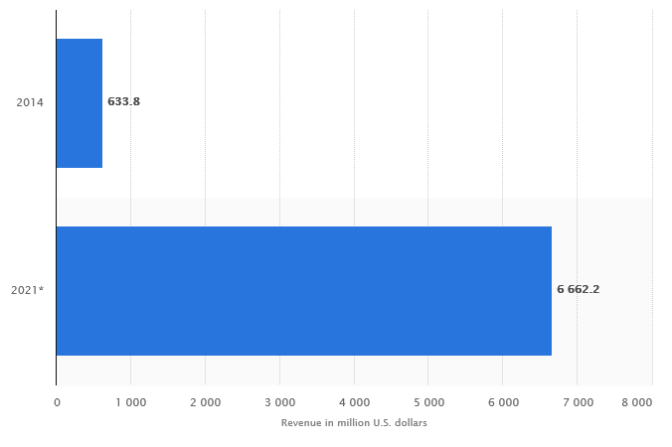The growth of AI in healthcare
Artificial Intelligence (AI) is swiftly gaining popularity in the digital health sector. Many companies are now changing their way of doing things to optimize productivity. AI has managed to capture the attention of key healthcare stakeholders, who are now in dilemma of whether or not to integrate it fully or partially in their businesses.
Today, AI is commonly used to recognize images and to identify, detect and classify objects. AI seeks to solve the adverse upshots of diseases such as Coronary heart disease, which is a major cause of adult deaths, Cervical Cancer, Breast Cancer and diabetic retinopathy.
Statistics has been used to determine the current worth of the AI in the healthcare market. Studies reveal the revenue generated by AI for healthcare applications sector in 2014 and 2021.

Image courtesy of Statista
From the graph above, the AI healthcare market is expected to rise significantly in value. Currently, the AI healthcare market is estimated to worth 633 million US dollars in terms of revenue. This value is predicted to rise to 6.7 billion US dollars. Today, there are more than 1,000 AI startups globally. Some of the major startups include Cliniserve, Aindra Systems, and Tricog Health.
Cliniserve uses AI by prioritizing patients’ tasks and needs and structuring them after which it forwards them to the ward staff. AiCure uses AI to automatically identify medication, confirm ingestion, detect duplicate enrollment and offer facial recognition.
AI is being used in healthcare segments such as eyesight healthcare to give patients vision and in the treatment of headaches where a minute remote-controlled device implanted in the patient’s body is used to convey electrical pulses that subsequently helps in minimizing the effect of a headache. AI is also used in the monitoring of blood glucose where an artificial pancreas using sensor is used to measure blood glucose and subsequently changing the dosage based on the readings.
Moreover, AI helps in the treatment of pain and narcotic pain reducers addiction where doses of buprenorphine are automatically administered in opioid-dependent patients through an implant.
| Recommended for you | |
| New ways to slash alarm fatigue in hospitals | |
| Sustainability as a key factor for future hospital planning | |
| NVIDIA plans to develop AI-powered medical imaging platform |
How AI is helping nurses in providing better healthcare services
To help improve clinical workflow, hospitals are now considering AI technology in the management of medical records among other data. This step is critical in enhancing quality healthcare. Typically, hospitals need to regularly compile and analyze information such as medical records. Human error is one of the common challenges faced when hospitals employ human labor. This can compromise the quality of information that is highly-valued when it comes to patient’s medical history.
AI relieves hospitals of this kind of hassle by taking care of the data management aspect through collecting, keeping, re-formatting and tracking data. This consequently enhances data access.
AI has come to solve the challenge of facing a shortage of specialized nurses. The number of professionally trained nurses globally still cannot meet the numerous numbers of patients who need constant monitoring and attention. AI comes in handy to help nurses tend to their patients easily without necessarily being present by their side.
AI has seen the introduction of the first global virtual nurse known as Molly. This virtual nurse is the product of Sensely. It helps to manage patients, especially, those with chronic illnesses in need of prolonged management, special monitoring and dedicated follow-up care.
Also, AI helps nurses to see to it that their patients abide by their treatment within a shorter duration. This has seen the introduction of the AiCure app, responsible for confirming medical ingestion through the use of AI and front camera of a smartphone.
Medication error is a pre-existing issue in many hospitals all over the world. Nurses may fail to determine or choose the correct type of medicine or the right dosage to administer to a patient. Medication errors have led to many deaths, which would otherwise have been avoided. This issue, in most cases, may be attributed to nurses’ carelessness, reluctance, lack of professionalism, fatigue or distraction. AI can be used to assist nurses to determine the precise type and quantity of medication that needs to be administered to a patient.
This is because AI is a wide platform served with lots of information on various types of illnesses alongside their appropriate cure and procedure of application. Also, AI machines are not susceptible to distraction or fatigue as compared to human nurses. Once they are well-programmed and maintained, they can operate efficiently for longer hours, serving a significant number of patients.
Strained administrative workflow is also an issue that has long been experienced in healthcare sectors. Nurses are subjected to loads of work that overwhelms their capability. Medication error is one of the main consequences of a strained administrative workflow. AI can be applied by nurses to help manage administrative workflow by introducing the global virtual nurse to help take care of patients.
Top startups developing AI solutions for nurses
Since the idea of integrating AI in healthcare sectors is proving effective, many companies are now seeing an opportunity to expand their businesses towards AI. Many startups have now been introduced to provide dedicated services to hospitals. Some of these startups include Cliniserve, AiCure, Systems, Arterys, Babylon, and Freenome.
Cliniserve applies AI for prioritizing the tasks and needs of patients and perfectly structuring them before forwarding them to the ward staff.
Hospitals using Cliniserve are more likely to save costs since the staff is employed based on their qualification, minimize stress as a result of the structured allocation of requests and enhance comfort by offering patients an appreciable stay.
Cliniserve works by receiving a patient’s inquiry and processing through its workflow management system and subsequently passing the inquiries to the nursing staff. Cliniserve has partnered with eit Health, Medical Valley, Klinikum, and Xpreneurs. Tricog Health’s solutions are used by GE Healthcare.
AiCure works by accurately capturing, analyzing and affecting behavior via AI. This helps improve patient engagement. Babylon’s AI system helps nurses observe the lifestyle of their patients and offer the most appropriate advice to enhance their health.
AI turning hospitals into smart factories
AI is now becoming a significant part of the healthcare sector. Hospitals are now seeing the need to adopt AI in their different aspects of an operation. This is as a result of the desirable results enjoyed so far by many hospitals considering this new innovation. Healthcare sector is now seeing the need to replace manual labor with digitally-driven labor.
The number of staff required to manage patients has greatly reduced since the introduction of AI in hospitals. Hospital employees are now being relieved of the task of having to collect and analyze information as well as attending to patients thanks to the effectiveness and reliability of AI.
This is significantly saving on time as well as the cost of labor while at the same time improving efficiency. With this trend of using AI in modern healthcare predicted to improve, the hospital infrastructure can expect a more gratifying transformation that would enhance the quality of healthcare further.
Image credit: www.istockphoto.com

















